Leadership and Management: Roles, Theories, and Operations at Tesco
VerifiedAdded on 2020/12/18
|14
|4080
|138
Report
AI Summary
This report delves into the critical concepts of leadership and management, employing Tesco as a real-world case study to illustrate key principles. It begins by differentiating between the roles and characteristics of leaders and managers, examining their functions within various situational contexts. The report explores prominent leadership and management theories and models, including situational leadership and system theory, and their application within an organizational setting. Furthermore, it investigates the key approaches and roles of leaders and managers in operations management, such as operations strategy, planning and controlling, lean manufacturing, and Six Sigma, emphasizing their importance in achieving organizational goals. The report concludes by highlighting the factors that impact operational management and decision-making processes, offering insights into how organizations like Tesco can enhance their performance through effective leadership and management strategies.
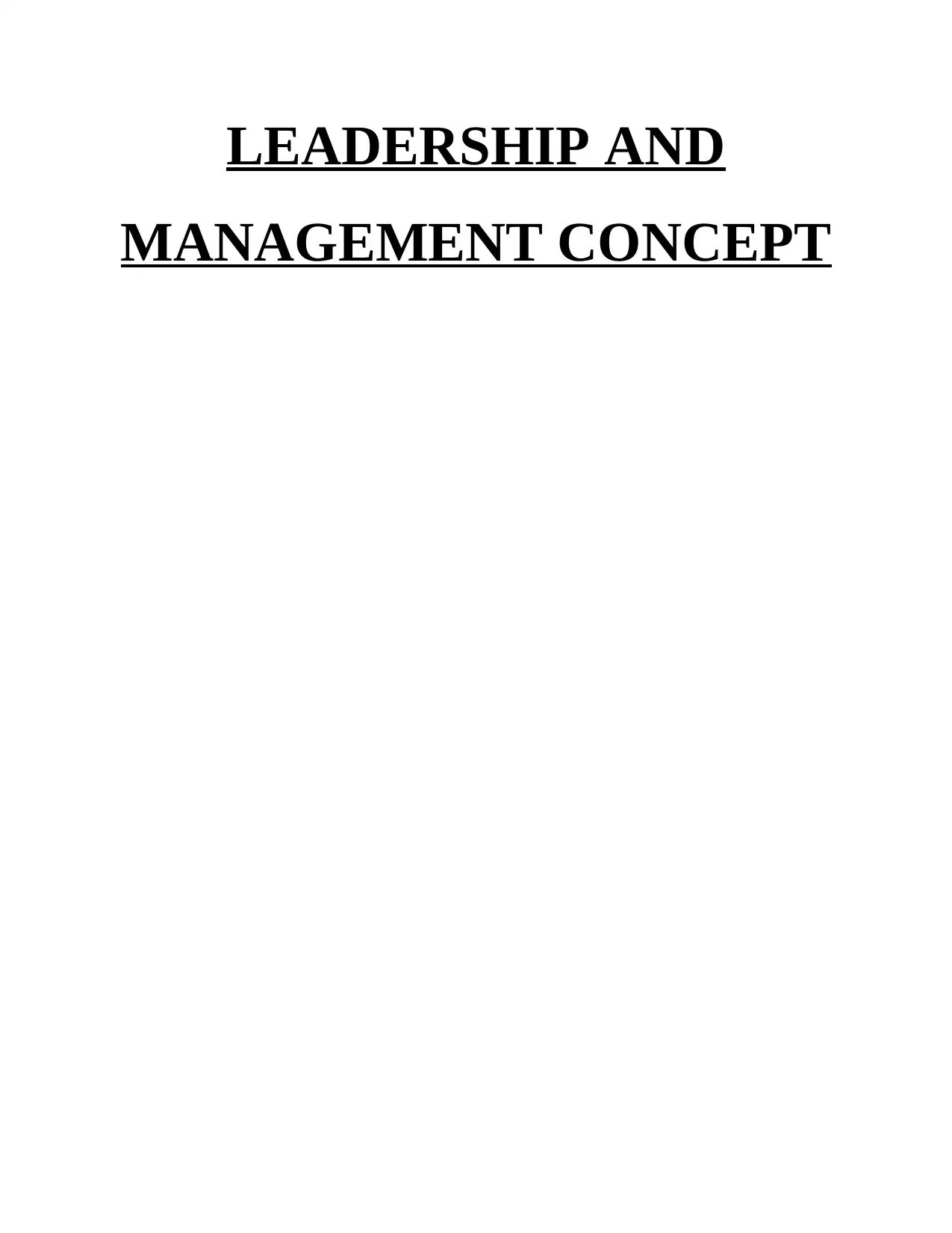
LEADERSHIP AND
MANAGEMENT CONCEPT
MANAGEMENT CONCEPT
Paraphrase This Document
Need a fresh take? Get an instant paraphrase of this document with our AI Paraphraser
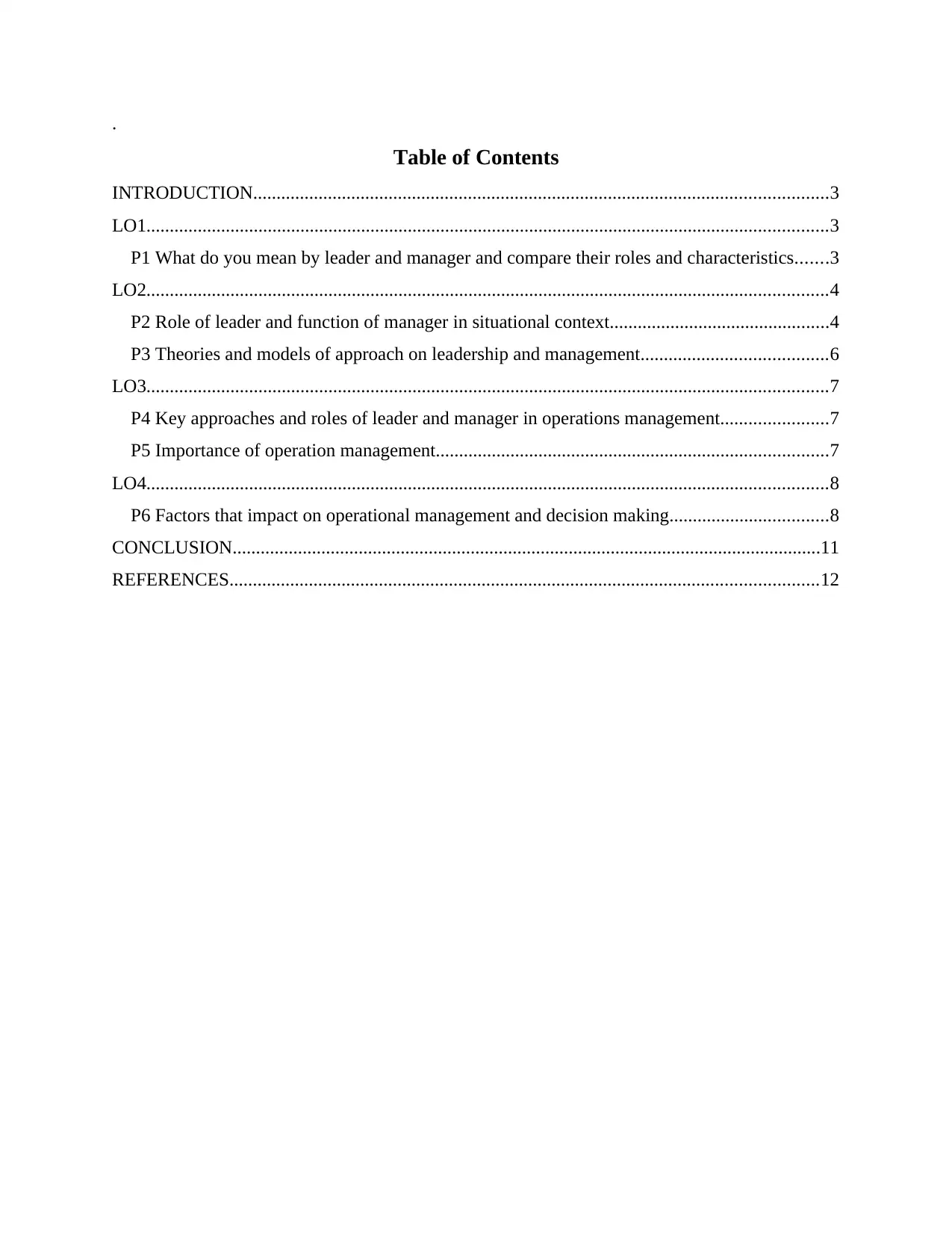
.
Table of Contents
INTRODUCTION...........................................................................................................................3
LO1..................................................................................................................................................3
P1 What do you mean by leader and manager and compare their roles and characteristics.......3
LO2..................................................................................................................................................4
P2 Role of leader and function of manager in situational context...............................................4
P3 Theories and models of approach on leadership and management........................................6
LO3..................................................................................................................................................7
P4 Key approaches and roles of leader and manager in operations management.......................7
P5 Importance of operation management....................................................................................7
LO4..................................................................................................................................................8
P6 Factors that impact on operational management and decision making..................................8
CONCLUSION..............................................................................................................................11
REFERENCES..............................................................................................................................12
Table of Contents
INTRODUCTION...........................................................................................................................3
LO1..................................................................................................................................................3
P1 What do you mean by leader and manager and compare their roles and characteristics.......3
LO2..................................................................................................................................................4
P2 Role of leader and function of manager in situational context...............................................4
P3 Theories and models of approach on leadership and management........................................6
LO3..................................................................................................................................................7
P4 Key approaches and roles of leader and manager in operations management.......................7
P5 Importance of operation management....................................................................................7
LO4..................................................................................................................................................8
P6 Factors that impact on operational management and decision making..................................8
CONCLUSION..............................................................................................................................11
REFERENCES..............................................................................................................................12
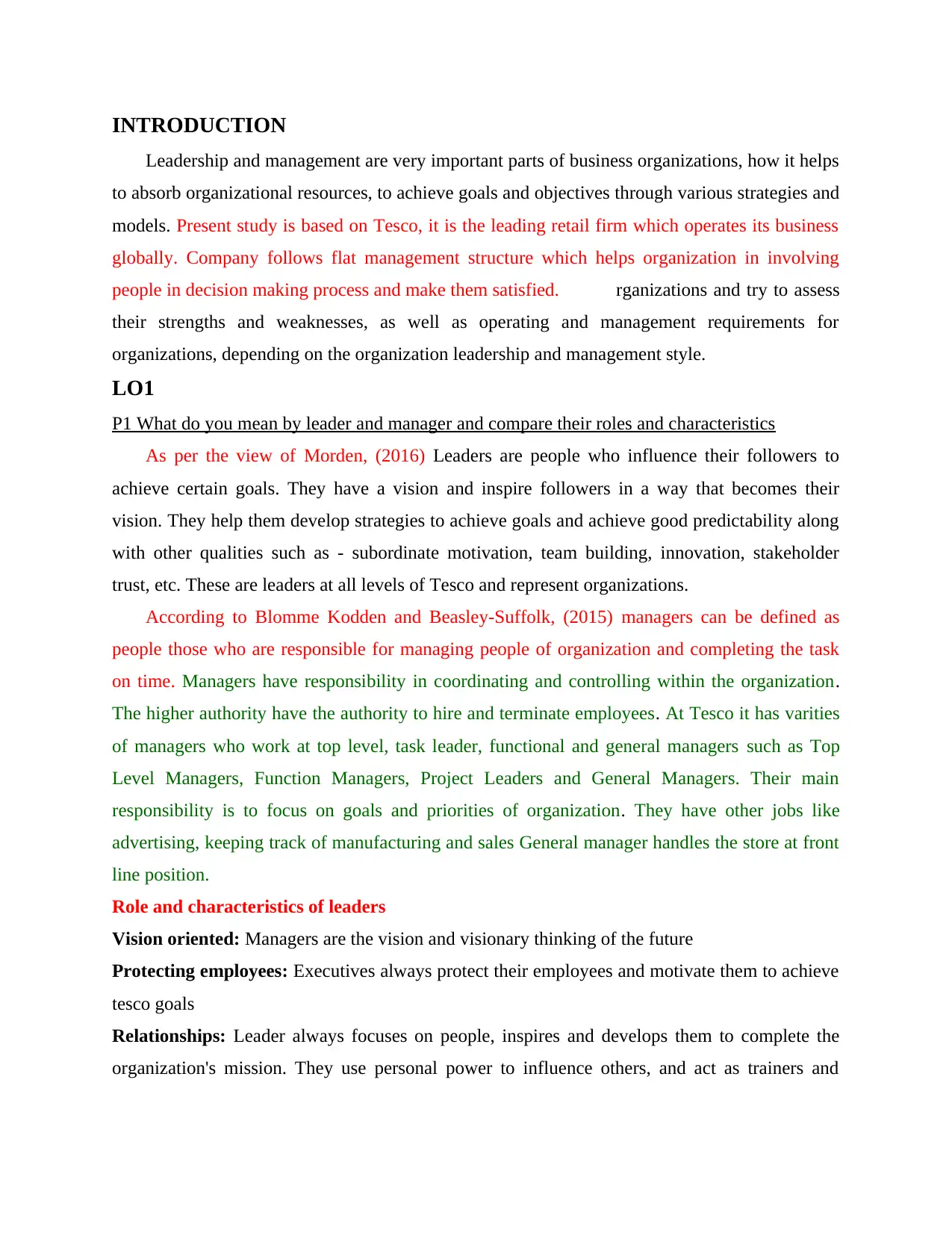
INTRODUCTION
Leadership and management are very important parts of business organizations, how it helps
to absorb organizational resources, to achieve goals and objectives through various strategies and
models. Present study is based on Tesco, it is the leading retail firm which operates its business
globally. Company follows flat management structure which helps organization in involving
people in decision making process and make them satisfied. rganizations and try to assess
their strengths and weaknesses, as well as operating and management requirements for
organizations, depending on the organization leadership and management style.
LO1
P1 What do you mean by leader and manager and compare their roles and characteristics
As per the view of Morden, (2016) Leaders are people who influence their followers to
achieve certain goals. They have a vision and inspire followers in a way that becomes their
vision. They help them develop strategies to achieve goals and achieve good predictability along
with other qualities such as - subordinate motivation, team building, innovation, stakeholder
trust, etc. These are leaders at all levels of Tesco and represent organizations.
According to Blomme Kodden and Beasley-Suffolk, (2015) managers can be defined as
people those who are responsible for managing people of organization and completing the task
on time. Managers have responsibility in coordinating and controlling within the organization.
The higher authority have the authority to hire and terminate employees. At Tesco it has varities
of managers who work at top level, task leader, functional and general managers such as Top
Level Managers, Function Managers, Project Leaders and General Managers. Their main
responsibility is to focus on goals and priorities of organization. They have other jobs like
advertising, keeping track of manufacturing and sales General manager handles the store at front
line position.
Role and characteristics of leaders
Vision oriented: Managers are the vision and visionary thinking of the future
Protecting employees: Executives always protect their employees and motivate them to achieve
tesco goals
Relationships: Leader always focuses on people, inspires and develops them to complete the
organization's mission. They use personal power to influence others, and act as trainers and
Leadership and management are very important parts of business organizations, how it helps
to absorb organizational resources, to achieve goals and objectives through various strategies and
models. Present study is based on Tesco, it is the leading retail firm which operates its business
globally. Company follows flat management structure which helps organization in involving
people in decision making process and make them satisfied. rganizations and try to assess
their strengths and weaknesses, as well as operating and management requirements for
organizations, depending on the organization leadership and management style.
LO1
P1 What do you mean by leader and manager and compare their roles and characteristics
As per the view of Morden, (2016) Leaders are people who influence their followers to
achieve certain goals. They have a vision and inspire followers in a way that becomes their
vision. They help them develop strategies to achieve goals and achieve good predictability along
with other qualities such as - subordinate motivation, team building, innovation, stakeholder
trust, etc. These are leaders at all levels of Tesco and represent organizations.
According to Blomme Kodden and Beasley-Suffolk, (2015) managers can be defined as
people those who are responsible for managing people of organization and completing the task
on time. Managers have responsibility in coordinating and controlling within the organization.
The higher authority have the authority to hire and terminate employees. At Tesco it has varities
of managers who work at top level, task leader, functional and general managers such as Top
Level Managers, Function Managers, Project Leaders and General Managers. Their main
responsibility is to focus on goals and priorities of organization. They have other jobs like
advertising, keeping track of manufacturing and sales General manager handles the store at front
line position.
Role and characteristics of leaders
Vision oriented: Managers are the vision and visionary thinking of the future
Protecting employees: Executives always protect their employees and motivate them to achieve
tesco goals
Relationships: Leader always focuses on people, inspires and develops them to complete the
organization's mission. They use personal power to influence others, and act as trainers and
⊘ This is a preview!⊘
Do you want full access?
Subscribe today to unlock all pages.

Trusted by 1+ million students worldwide

facilitators for followers (Leadership vs. Management: Characteristics of a Manager, 2016).
They also encourage creativity and focus on dynamic changes in the environment.
Grouping: Leadership always creates a culture of communication and listening to one another,
helping others and making others happy. They also reduce restrictions and create teamwork
within the Tesco.
Role and characteristics of managers
Process oriented: Managers always think about the processes that the organization performs
effectively.
Protect self: Managers always defend themselves
Manager focuses on objectivity and focuses primarily on organizational results, reports and
mechanisms. To influence others, managers depend on position and uses control rather than
motivation.
Managers believes in line and personnel management, trusts the organization, personnel and
structure, creates boundaries and focuses on direct and control and give solutions and guidance
to the Tesco
LO2
P2 Leader's importance and manager functionality in different situations.
The manager's role and management function is the TESCO organization to improve and
change company activities for various types of governance and governance features. This
concept allows for changes in factors that initiate knowledge about management activities
(Morden, 2016). The effectiveness of the organization depends upon various situations which are
as follows:
Stable situation – The situation in which organization goals and vision affect stability and the
changes that company did not have experience. For example, the market depends upon various
economic factors like inflation and recession which can make the organization unstable.
Changes to slow situations – The situations related to slow development and competencies can
affect the organization change management which will delay the outcomes in a moderate manner
which can influence market, the situation changes moderately affect leader's importance and
manager functionality in different situations., focusing on results.
A rapidly changing situation - This situation is currently the fastest situation in organizational
goals because conditions that change rapidly have recovered depending on the market
They also encourage creativity and focus on dynamic changes in the environment.
Grouping: Leadership always creates a culture of communication and listening to one another,
helping others and making others happy. They also reduce restrictions and create teamwork
within the Tesco.
Role and characteristics of managers
Process oriented: Managers always think about the processes that the organization performs
effectively.
Protect self: Managers always defend themselves
Manager focuses on objectivity and focuses primarily on organizational results, reports and
mechanisms. To influence others, managers depend on position and uses control rather than
motivation.
Managers believes in line and personnel management, trusts the organization, personnel and
structure, creates boundaries and focuses on direct and control and give solutions and guidance
to the Tesco
LO2
P2 Leader's importance and manager functionality in different situations.
The manager's role and management function is the TESCO organization to improve and
change company activities for various types of governance and governance features. This
concept allows for changes in factors that initiate knowledge about management activities
(Morden, 2016). The effectiveness of the organization depends upon various situations which are
as follows:
Stable situation – The situation in which organization goals and vision affect stability and the
changes that company did not have experience. For example, the market depends upon various
economic factors like inflation and recession which can make the organization unstable.
Changes to slow situations – The situations related to slow development and competencies can
affect the organization change management which will delay the outcomes in a moderate manner
which can influence market, the situation changes moderately affect leader's importance and
manager functionality in different situations., focusing on results.
A rapidly changing situation - This situation is currently the fastest situation in organizational
goals because conditions that change rapidly have recovered depending on the market
Paraphrase This Document
Need a fresh take? Get an instant paraphrase of this document with our AI Paraphraser
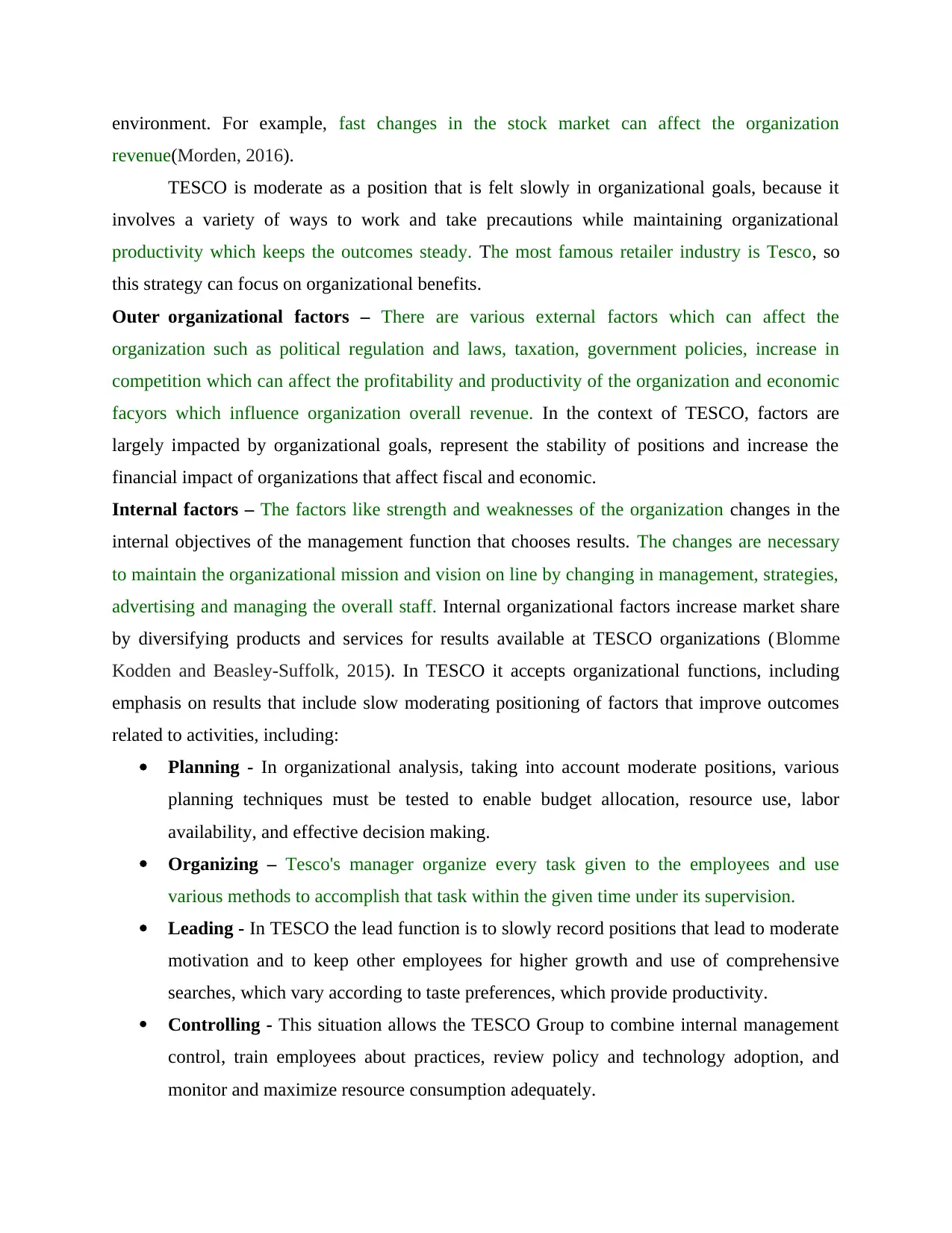
environment. For example, fast changes in the stock market can affect the organization
revenue(Morden, 2016).
TESCO is moderate as a position that is felt slowly in organizational goals, because it
involves a variety of ways to work and take precautions while maintaining organizational
productivity which keeps the outcomes steady. The most famous retailer industry is Tesco, so
this strategy can focus on organizational benefits.
Outer organizational factors – There are various external factors which can affect the
organization such as political regulation and laws, taxation, government policies, increase in
competition which can affect the profitability and productivity of the organization and economic
facyors which influence organization overall revenue. In the context of TESCO, factors are
largely impacted by organizational goals, represent the stability of positions and increase the
financial impact of organizations that affect fiscal and economic.
Internal factors – The factors like strength and weaknesses of the organization changes in the
internal objectives of the management function that chooses results. The changes are necessary
to maintain the organizational mission and vision on line by changing in management, strategies,
advertising and managing the overall staff. Internal organizational factors increase market share
by diversifying products and services for results available at TESCO organizations (Blomme
Kodden and Beasley-Suffolk, 2015). In TESCO it accepts organizational functions, including
emphasis on results that include slow moderating positioning of factors that improve outcomes
related to activities, including:
Planning - In organizational analysis, taking into account moderate positions, various
planning techniques must be tested to enable budget allocation, resource use, labor
availability, and effective decision making.
Organizing – Tesco's manager organize every task given to the employees and use
various methods to accomplish that task within the given time under its supervision.
Leading - In TESCO the lead function is to slowly record positions that lead to moderate
motivation and to keep other employees for higher growth and use of comprehensive
searches, which vary according to taste preferences, which provide productivity.
Controlling - This situation allows the TESCO Group to combine internal management
control, train employees about practices, review policy and technology adoption, and
monitor and maximize resource consumption adequately.
revenue(Morden, 2016).
TESCO is moderate as a position that is felt slowly in organizational goals, because it
involves a variety of ways to work and take precautions while maintaining organizational
productivity which keeps the outcomes steady. The most famous retailer industry is Tesco, so
this strategy can focus on organizational benefits.
Outer organizational factors – There are various external factors which can affect the
organization such as political regulation and laws, taxation, government policies, increase in
competition which can affect the profitability and productivity of the organization and economic
facyors which influence organization overall revenue. In the context of TESCO, factors are
largely impacted by organizational goals, represent the stability of positions and increase the
financial impact of organizations that affect fiscal and economic.
Internal factors – The factors like strength and weaknesses of the organization changes in the
internal objectives of the management function that chooses results. The changes are necessary
to maintain the organizational mission and vision on line by changing in management, strategies,
advertising and managing the overall staff. Internal organizational factors increase market share
by diversifying products and services for results available at TESCO organizations (Blomme
Kodden and Beasley-Suffolk, 2015). In TESCO it accepts organizational functions, including
emphasis on results that include slow moderating positioning of factors that improve outcomes
related to activities, including:
Planning - In organizational analysis, taking into account moderate positions, various
planning techniques must be tested to enable budget allocation, resource use, labor
availability, and effective decision making.
Organizing – Tesco's manager organize every task given to the employees and use
various methods to accomplish that task within the given time under its supervision.
Leading - In TESCO the lead function is to slowly record positions that lead to moderate
motivation and to keep other employees for higher growth and use of comprehensive
searches, which vary according to taste preferences, which provide productivity.
Controlling - This situation allows the TESCO Group to combine internal management
control, train employees about practices, review policy and technology adoption, and
monitor and maximize resource consumption adequately.
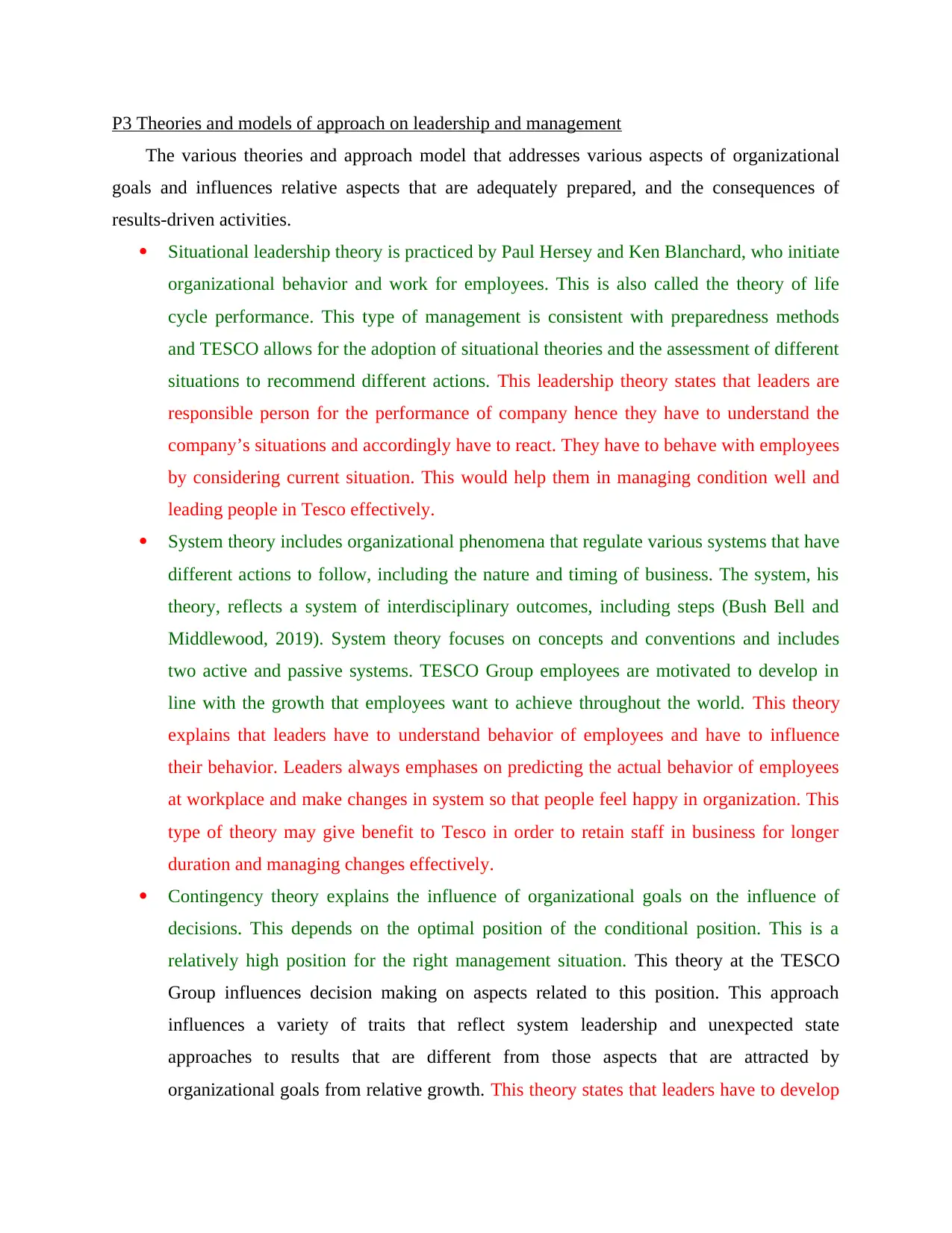
P3 Theories and models of approach on leadership and management
The various theories and approach model that addresses various aspects of organizational
goals and influences relative aspects that are adequately prepared, and the consequences of
results-driven activities.
Situational leadership theory is practiced by Paul Hersey and Ken Blanchard, who initiate
organizational behavior and work for employees. This is also called the theory of life
cycle performance. This type of management is consistent with preparedness methods
and TESCO allows for the adoption of situational theories and the assessment of different
situations to recommend different actions. This leadership theory states that leaders are
responsible person for the performance of company hence they have to understand the
company’s situations and accordingly have to react. They have to behave with employees
by considering current situation. This would help them in managing condition well and
leading people in Tesco effectively.
System theory includes organizational phenomena that regulate various systems that have
different actions to follow, including the nature and timing of business. The system, his
theory, reflects a system of interdisciplinary outcomes, including steps (Bush Bell and
Middlewood, 2019). System theory focuses on concepts and conventions and includes
two active and passive systems. TESCO Group employees are motivated to develop in
line with the growth that employees want to achieve throughout the world. This theory
explains that leaders have to understand behavior of employees and have to influence
their behavior. Leaders always emphases on predicting the actual behavior of employees
at workplace and make changes in system so that people feel happy in organization. This
type of theory may give benefit to Tesco in order to retain staff in business for longer
duration and managing changes effectively.
Contingency theory explains the influence of organizational goals on the influence of
decisions. This depends on the optimal position of the conditional position. This is a
relatively high position for the right management situation. This theory at the TESCO
Group influences decision making on aspects related to this position. This approach
influences a variety of traits that reflect system leadership and unexpected state
approaches to results that are different from those aspects that are attracted by
organizational goals from relative growth. This theory states that leaders have to develop
The various theories and approach model that addresses various aspects of organizational
goals and influences relative aspects that are adequately prepared, and the consequences of
results-driven activities.
Situational leadership theory is practiced by Paul Hersey and Ken Blanchard, who initiate
organizational behavior and work for employees. This is also called the theory of life
cycle performance. This type of management is consistent with preparedness methods
and TESCO allows for the adoption of situational theories and the assessment of different
situations to recommend different actions. This leadership theory states that leaders are
responsible person for the performance of company hence they have to understand the
company’s situations and accordingly have to react. They have to behave with employees
by considering current situation. This would help them in managing condition well and
leading people in Tesco effectively.
System theory includes organizational phenomena that regulate various systems that have
different actions to follow, including the nature and timing of business. The system, his
theory, reflects a system of interdisciplinary outcomes, including steps (Bush Bell and
Middlewood, 2019). System theory focuses on concepts and conventions and includes
two active and passive systems. TESCO Group employees are motivated to develop in
line with the growth that employees want to achieve throughout the world. This theory
explains that leaders have to understand behavior of employees and have to influence
their behavior. Leaders always emphases on predicting the actual behavior of employees
at workplace and make changes in system so that people feel happy in organization. This
type of theory may give benefit to Tesco in order to retain staff in business for longer
duration and managing changes effectively.
Contingency theory explains the influence of organizational goals on the influence of
decisions. This depends on the optimal position of the conditional position. This is a
relatively high position for the right management situation. This theory at the TESCO
Group influences decision making on aspects related to this position. This approach
influences a variety of traits that reflect system leadership and unexpected state
approaches to results that are different from those aspects that are attracted by
organizational goals from relative growth. This theory states that leaders have to develop
⊘ This is a preview!⊘
Do you want full access?
Subscribe today to unlock all pages.

Trusted by 1+ million students worldwide
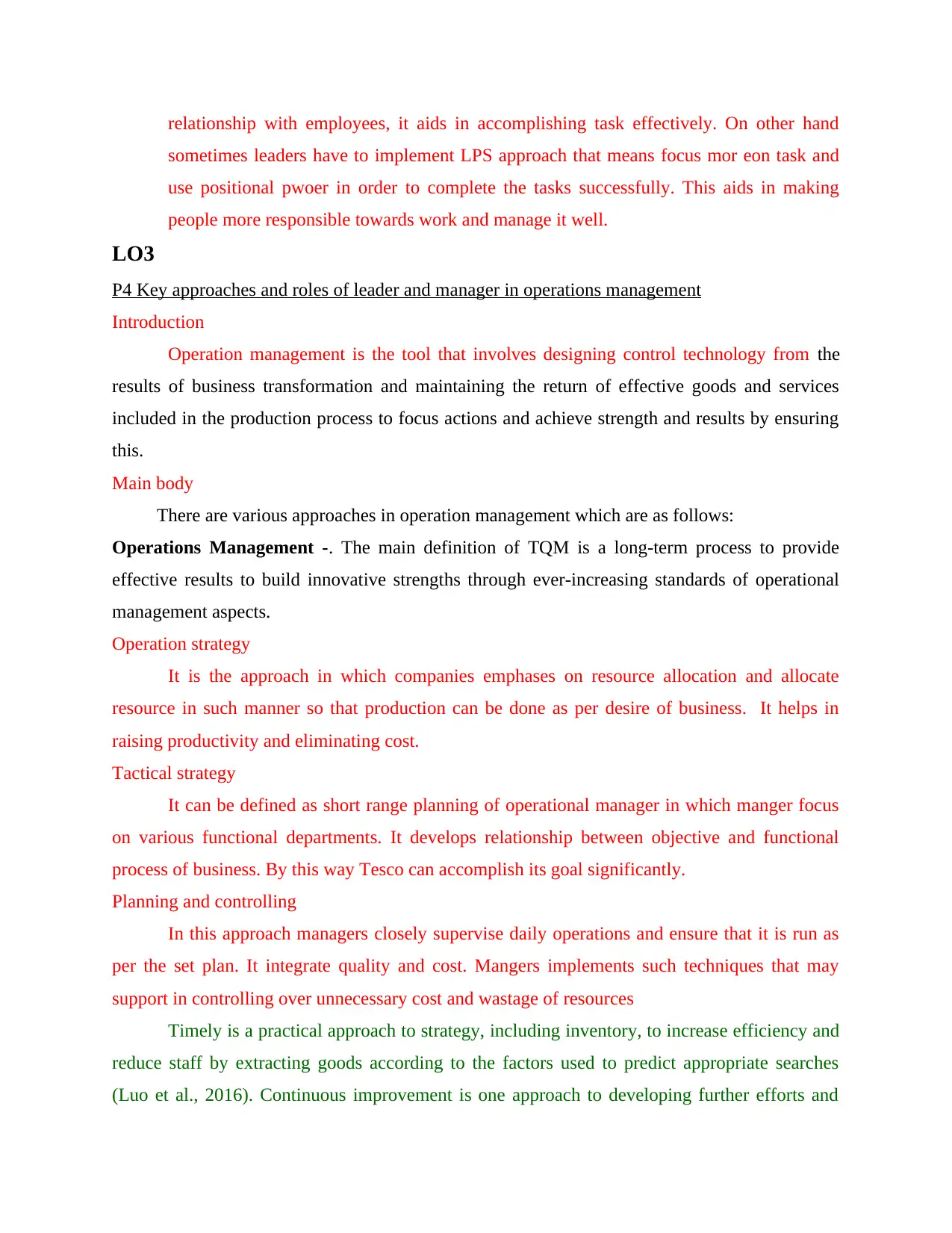
relationship with employees, it aids in accomplishing task effectively. On other hand
sometimes leaders have to implement LPS approach that means focus mor eon task and
use positional pwoer in order to complete the tasks successfully. This aids in making
people more responsible towards work and manage it well.
LO3
P4 Key approaches and roles of leader and manager in operations management
Introduction
Operation management is the tool that involves designing control technology from the
results of business transformation and maintaining the return of effective goods and services
included in the production process to focus actions and achieve strength and results by ensuring
this.
Main body
There are various approaches in operation management which are as follows:
Operations Management -. The main definition of TQM is a long-term process to provide
effective results to build innovative strengths through ever-increasing standards of operational
management aspects.
Operation strategy
It is the approach in which companies emphases on resource allocation and allocate
resource in such manner so that production can be done as per desire of business. It helps in
raising productivity and eliminating cost.
Tactical strategy
It can be defined as short range planning of operational manager in which manger focus
on various functional departments. It develops relationship between objective and functional
process of business. By this way Tesco can accomplish its goal significantly.
Planning and controlling
In this approach managers closely supervise daily operations and ensure that it is run as
per the set plan. It integrate quality and cost. Mangers implements such techniques that may
support in controlling over unnecessary cost and wastage of resources
Timely is a practical approach to strategy, including inventory, to increase efficiency and
reduce staff by extracting goods according to the factors used to predict appropriate searches
(Luo et al., 2016). Continuous improvement is one approach to developing further efforts and
sometimes leaders have to implement LPS approach that means focus mor eon task and
use positional pwoer in order to complete the tasks successfully. This aids in making
people more responsible towards work and manage it well.
LO3
P4 Key approaches and roles of leader and manager in operations management
Introduction
Operation management is the tool that involves designing control technology from the
results of business transformation and maintaining the return of effective goods and services
included in the production process to focus actions and achieve strength and results by ensuring
this.
Main body
There are various approaches in operation management which are as follows:
Operations Management -. The main definition of TQM is a long-term process to provide
effective results to build innovative strengths through ever-increasing standards of operational
management aspects.
Operation strategy
It is the approach in which companies emphases on resource allocation and allocate
resource in such manner so that production can be done as per desire of business. It helps in
raising productivity and eliminating cost.
Tactical strategy
It can be defined as short range planning of operational manager in which manger focus
on various functional departments. It develops relationship between objective and functional
process of business. By this way Tesco can accomplish its goal significantly.
Planning and controlling
In this approach managers closely supervise daily operations and ensure that it is run as
per the set plan. It integrate quality and cost. Mangers implements such techniques that may
support in controlling over unnecessary cost and wastage of resources
Timely is a practical approach to strategy, including inventory, to increase efficiency and
reduce staff by extracting goods according to the factors used to predict appropriate searches
(Luo et al., 2016). Continuous improvement is one approach to developing further efforts and
Paraphrase This Document
Need a fresh take? Get an instant paraphrase of this document with our AI Paraphraser
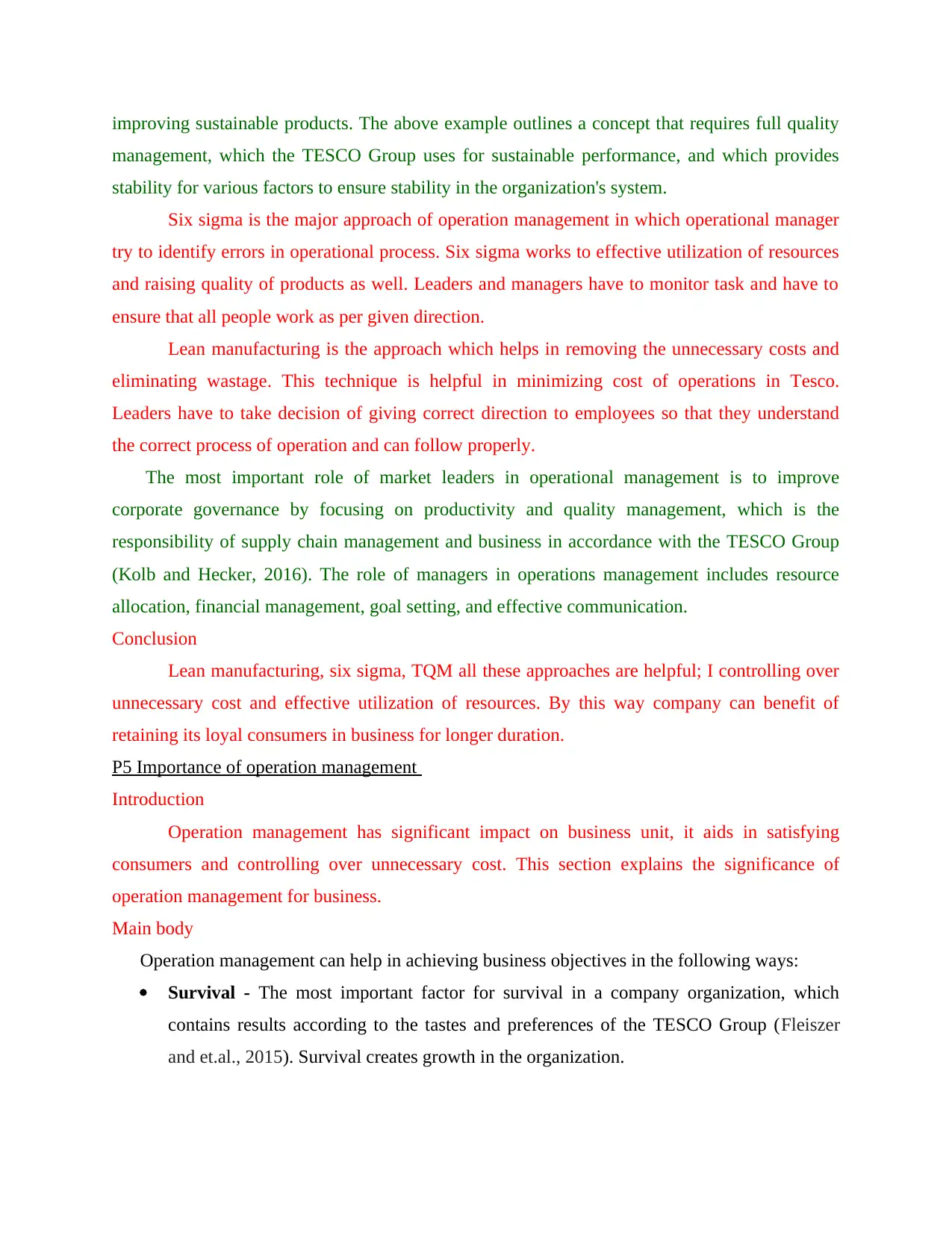
improving sustainable products. The above example outlines a concept that requires full quality
management, which the TESCO Group uses for sustainable performance, and which provides
stability for various factors to ensure stability in the organization's system.
Six sigma is the major approach of operation management in which operational manager
try to identify errors in operational process. Six sigma works to effective utilization of resources
and raising quality of products as well. Leaders and managers have to monitor task and have to
ensure that all people work as per given direction.
Lean manufacturing is the approach which helps in removing the unnecessary costs and
eliminating wastage. This technique is helpful in minimizing cost of operations in Tesco.
Leaders have to take decision of giving correct direction to employees so that they understand
the correct process of operation and can follow properly.
The most important role of market leaders in operational management is to improve
corporate governance by focusing on productivity and quality management, which is the
responsibility of supply chain management and business in accordance with the TESCO Group
(Kolb and Hecker, 2016). The role of managers in operations management includes resource
allocation, financial management, goal setting, and effective communication.
Conclusion
Lean manufacturing, six sigma, TQM all these approaches are helpful; I controlling over
unnecessary cost and effective utilization of resources. By this way company can benefit of
retaining its loyal consumers in business for longer duration.
P5 Importance of operation management
Introduction
Operation management has significant impact on business unit, it aids in satisfying
consumers and controlling over unnecessary cost. This section explains the significance of
operation management for business.
Main body
Operation management can help in achieving business objectives in the following ways:
Survival - The most important factor for survival in a company organization, which
contains results according to the tastes and preferences of the TESCO Group (Fleiszer
and et.al., 2015). Survival creates growth in the organization.
management, which the TESCO Group uses for sustainable performance, and which provides
stability for various factors to ensure stability in the organization's system.
Six sigma is the major approach of operation management in which operational manager
try to identify errors in operational process. Six sigma works to effective utilization of resources
and raising quality of products as well. Leaders and managers have to monitor task and have to
ensure that all people work as per given direction.
Lean manufacturing is the approach which helps in removing the unnecessary costs and
eliminating wastage. This technique is helpful in minimizing cost of operations in Tesco.
Leaders have to take decision of giving correct direction to employees so that they understand
the correct process of operation and can follow properly.
The most important role of market leaders in operational management is to improve
corporate governance by focusing on productivity and quality management, which is the
responsibility of supply chain management and business in accordance with the TESCO Group
(Kolb and Hecker, 2016). The role of managers in operations management includes resource
allocation, financial management, goal setting, and effective communication.
Conclusion
Lean manufacturing, six sigma, TQM all these approaches are helpful; I controlling over
unnecessary cost and effective utilization of resources. By this way company can benefit of
retaining its loyal consumers in business for longer duration.
P5 Importance of operation management
Introduction
Operation management has significant impact on business unit, it aids in satisfying
consumers and controlling over unnecessary cost. This section explains the significance of
operation management for business.
Main body
Operation management can help in achieving business objectives in the following ways:
Survival - The most important factor for survival in a company organization, which
contains results according to the tastes and preferences of the TESCO Group (Fleiszer
and et.al., 2015). Survival creates growth in the organization.
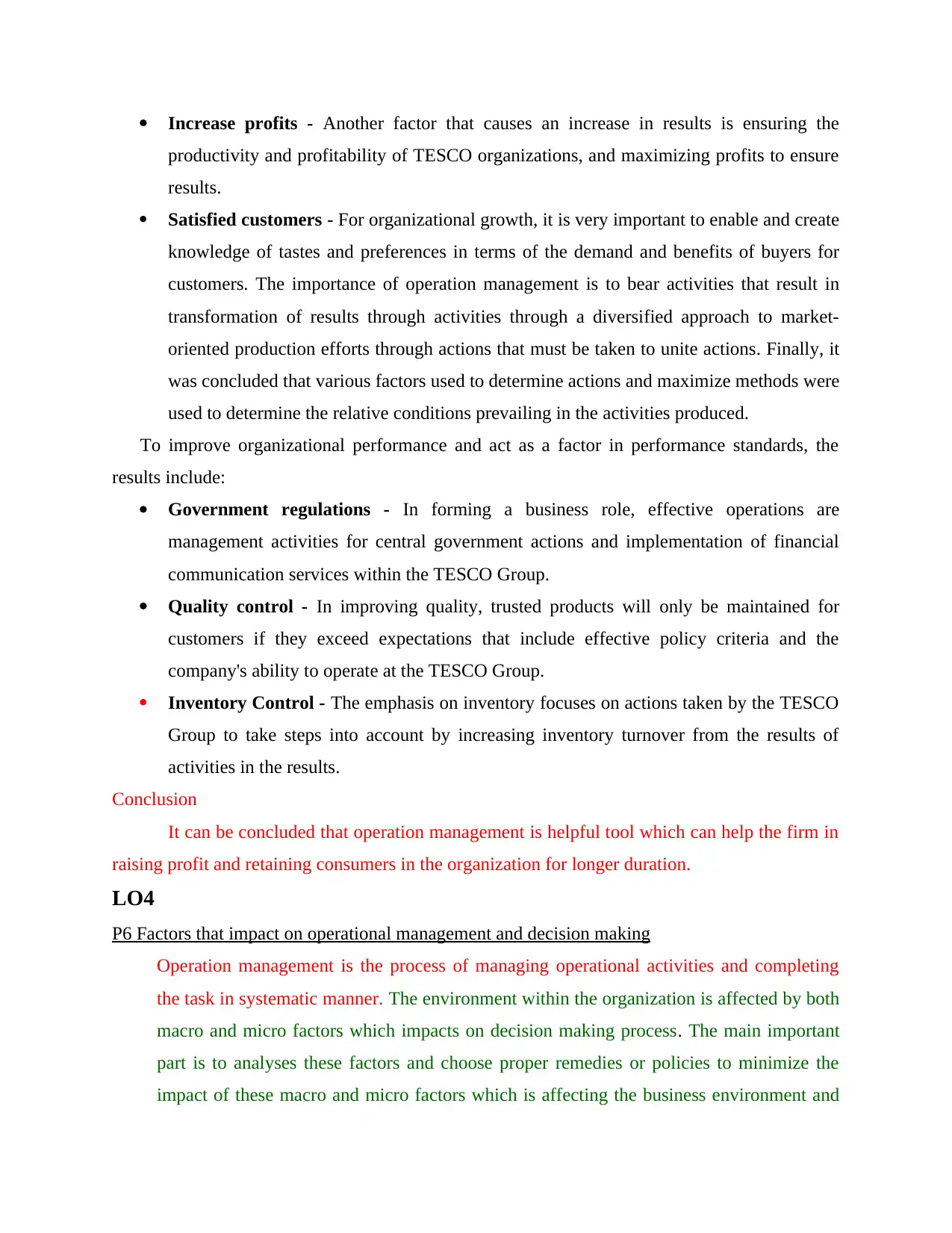
Increase profits - Another factor that causes an increase in results is ensuring the
productivity and profitability of TESCO organizations, and maximizing profits to ensure
results.
Satisfied customers - For organizational growth, it is very important to enable and create
knowledge of tastes and preferences in terms of the demand and benefits of buyers for
customers. The importance of operation management is to bear activities that result in
transformation of results through activities through a diversified approach to market-
oriented production efforts through actions that must be taken to unite actions. Finally, it
was concluded that various factors used to determine actions and maximize methods were
used to determine the relative conditions prevailing in the activities produced.
To improve organizational performance and act as a factor in performance standards, the
results include:
Government regulations - In forming a business role, effective operations are
management activities for central government actions and implementation of financial
communication services within the TESCO Group.
Quality control - In improving quality, trusted products will only be maintained for
customers if they exceed expectations that include effective policy criteria and the
company's ability to operate at the TESCO Group.
Inventory Control - The emphasis on inventory focuses on actions taken by the TESCO
Group to take steps into account by increasing inventory turnover from the results of
activities in the results.
Conclusion
It can be concluded that operation management is helpful tool which can help the firm in
raising profit and retaining consumers in the organization for longer duration.
LO4
P6 Factors that impact on operational management and decision making
Operation management is the process of managing operational activities and completing
the task in systematic manner. The environment within the organization is affected by both
macro and micro factors which impacts on decision making process. The main important
part is to analyses these factors and choose proper remedies or policies to minimize the
impact of these macro and micro factors which is affecting the business environment and
productivity and profitability of TESCO organizations, and maximizing profits to ensure
results.
Satisfied customers - For organizational growth, it is very important to enable and create
knowledge of tastes and preferences in terms of the demand and benefits of buyers for
customers. The importance of operation management is to bear activities that result in
transformation of results through activities through a diversified approach to market-
oriented production efforts through actions that must be taken to unite actions. Finally, it
was concluded that various factors used to determine actions and maximize methods were
used to determine the relative conditions prevailing in the activities produced.
To improve organizational performance and act as a factor in performance standards, the
results include:
Government regulations - In forming a business role, effective operations are
management activities for central government actions and implementation of financial
communication services within the TESCO Group.
Quality control - In improving quality, trusted products will only be maintained for
customers if they exceed expectations that include effective policy criteria and the
company's ability to operate at the TESCO Group.
Inventory Control - The emphasis on inventory focuses on actions taken by the TESCO
Group to take steps into account by increasing inventory turnover from the results of
activities in the results.
Conclusion
It can be concluded that operation management is helpful tool which can help the firm in
raising profit and retaining consumers in the organization for longer duration.
LO4
P6 Factors that impact on operational management and decision making
Operation management is the process of managing operational activities and completing
the task in systematic manner. The environment within the organization is affected by both
macro and micro factors which impacts on decision making process. The main important
part is to analyses these factors and choose proper remedies or policies to minimize the
impact of these macro and micro factors which is affecting the business environment and
⊘ This is a preview!⊘
Do you want full access?
Subscribe today to unlock all pages.

Trusted by 1+ million students worldwide
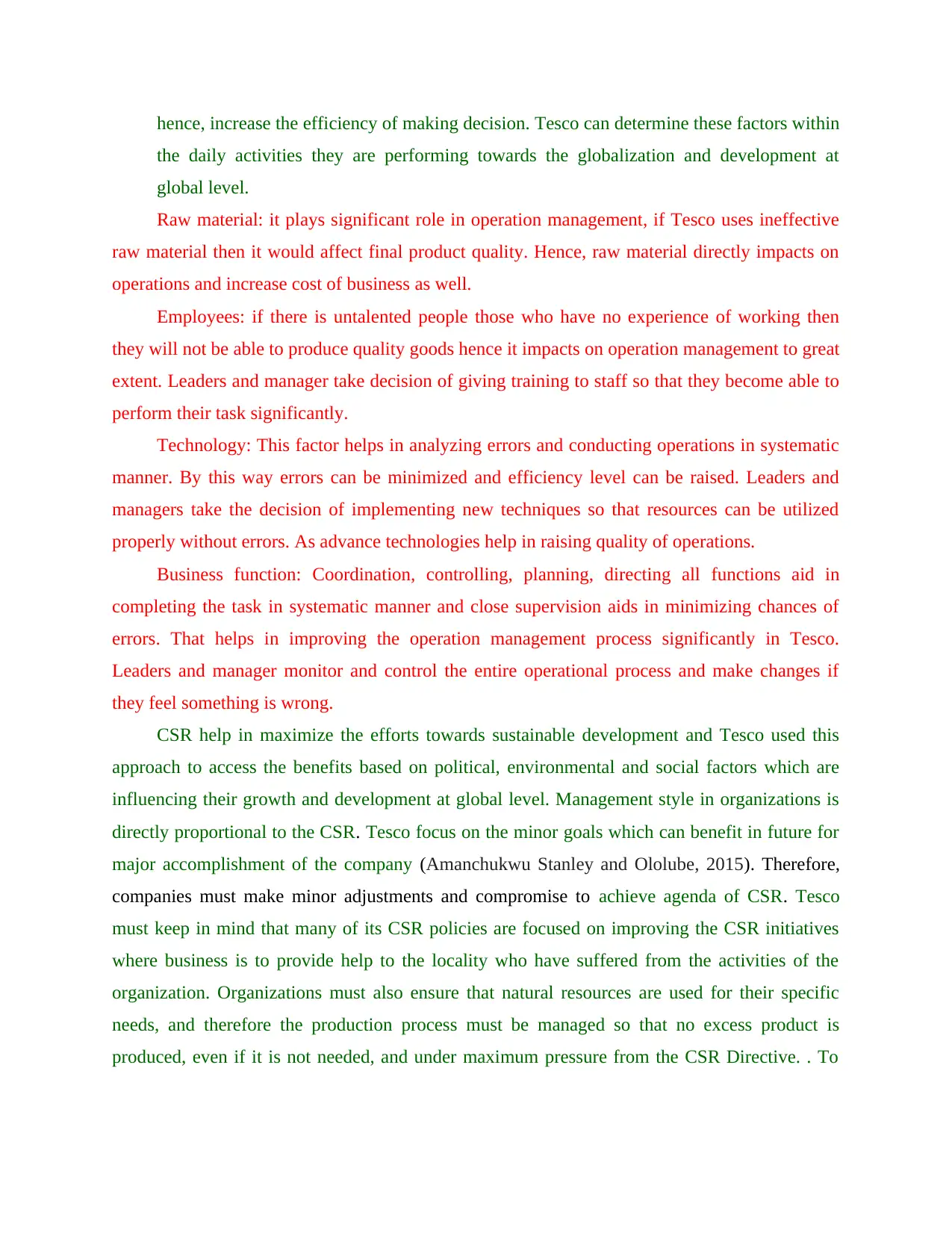
hence, increase the efficiency of making decision. Tesco can determine these factors within
the daily activities they are performing towards the globalization and development at
global level.
Raw material: it plays significant role in operation management, if Tesco uses ineffective
raw material then it would affect final product quality. Hence, raw material directly impacts on
operations and increase cost of business as well.
Employees: if there is untalented people those who have no experience of working then
they will not be able to produce quality goods hence it impacts on operation management to great
extent. Leaders and manager take decision of giving training to staff so that they become able to
perform their task significantly.
Technology: This factor helps in analyzing errors and conducting operations in systematic
manner. By this way errors can be minimized and efficiency level can be raised. Leaders and
managers take the decision of implementing new techniques so that resources can be utilized
properly without errors. As advance technologies help in raising quality of operations.
Business function: Coordination, controlling, planning, directing all functions aid in
completing the task in systematic manner and close supervision aids in minimizing chances of
errors. That helps in improving the operation management process significantly in Tesco.
Leaders and manager monitor and control the entire operational process and make changes if
they feel something is wrong.
CSR help in maximize the efforts towards sustainable development and Tesco used this
approach to access the benefits based on political, environmental and social factors which are
influencing their growth and development at global level. Management style in organizations is
directly proportional to the CSR. Tesco focus on the minor goals which can benefit in future for
major accomplishment of the company (Amanchukwu Stanley and Ololube, 2015). Therefore,
companies must make minor adjustments and compromise to achieve agenda of CSR. Tesco
must keep in mind that many of its CSR policies are focused on improving the CSR initiatives
where business is to provide help to the locality who have suffered from the activities of the
organization. Organizations must also ensure that natural resources are used for their specific
needs, and therefore the production process must be managed so that no excess product is
produced, even if it is not needed, and under maximum pressure from the CSR Directive. . To
the daily activities they are performing towards the globalization and development at
global level.
Raw material: it plays significant role in operation management, if Tesco uses ineffective
raw material then it would affect final product quality. Hence, raw material directly impacts on
operations and increase cost of business as well.
Employees: if there is untalented people those who have no experience of working then
they will not be able to produce quality goods hence it impacts on operation management to great
extent. Leaders and manager take decision of giving training to staff so that they become able to
perform their task significantly.
Technology: This factor helps in analyzing errors and conducting operations in systematic
manner. By this way errors can be minimized and efficiency level can be raised. Leaders and
managers take the decision of implementing new techniques so that resources can be utilized
properly without errors. As advance technologies help in raising quality of operations.
Business function: Coordination, controlling, planning, directing all functions aid in
completing the task in systematic manner and close supervision aids in minimizing chances of
errors. That helps in improving the operation management process significantly in Tesco.
Leaders and manager monitor and control the entire operational process and make changes if
they feel something is wrong.
CSR help in maximize the efforts towards sustainable development and Tesco used this
approach to access the benefits based on political, environmental and social factors which are
influencing their growth and development at global level. Management style in organizations is
directly proportional to the CSR. Tesco focus on the minor goals which can benefit in future for
major accomplishment of the company (Amanchukwu Stanley and Ololube, 2015). Therefore,
companies must make minor adjustments and compromise to achieve agenda of CSR. Tesco
must keep in mind that many of its CSR policies are focused on improving the CSR initiatives
where business is to provide help to the locality who have suffered from the activities of the
organization. Organizations must also ensure that natural resources are used for their specific
needs, and therefore the production process must be managed so that no excess product is
produced, even if it is not needed, and under maximum pressure from the CSR Directive. . To
Paraphrase This Document
Need a fresh take? Get an instant paraphrase of this document with our AI Paraphraser
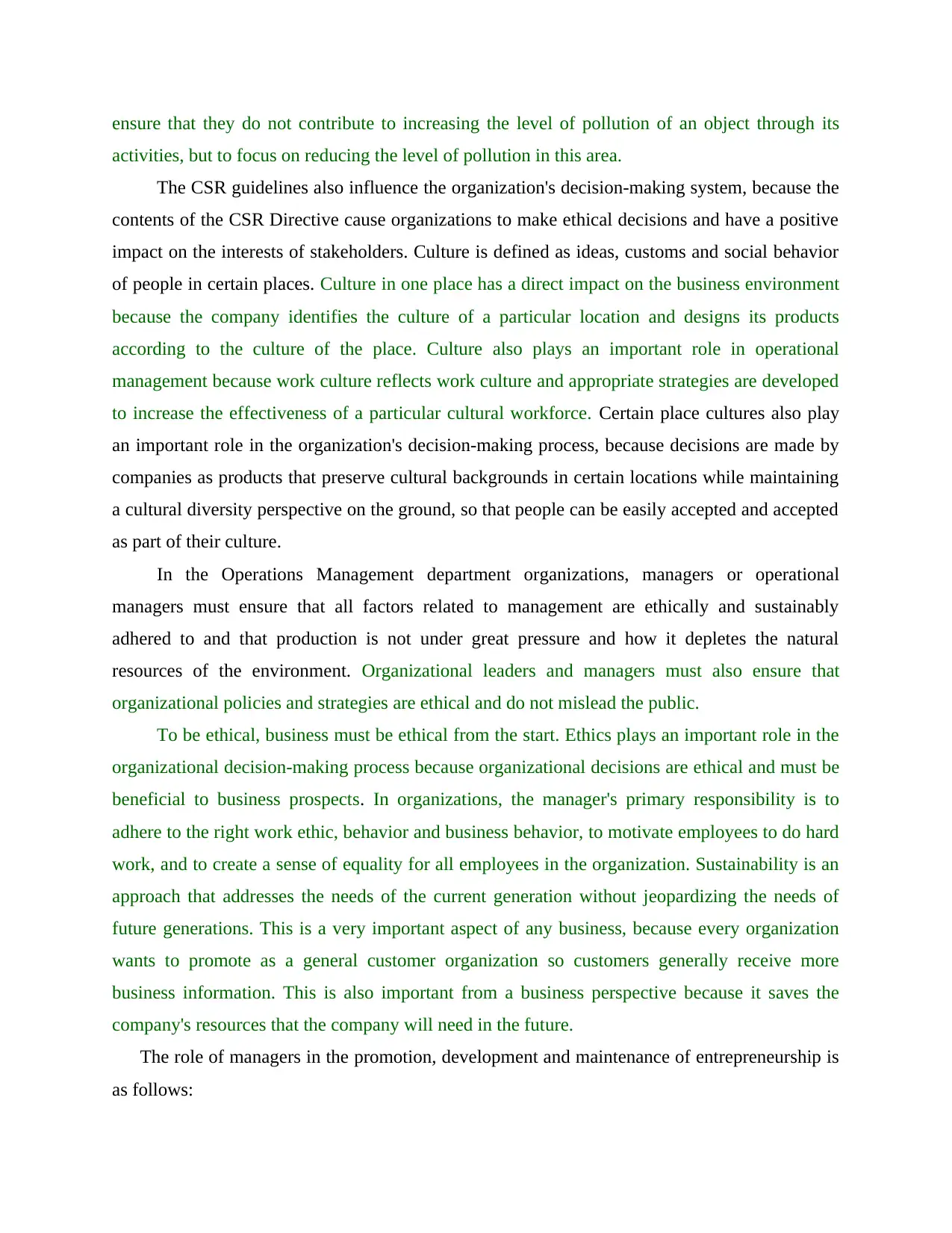
ensure that they do not contribute to increasing the level of pollution of an object through its
activities, but to focus on reducing the level of pollution in this area.
The CSR guidelines also influence the organization's decision-making system, because the
contents of the CSR Directive cause organizations to make ethical decisions and have a positive
impact on the interests of stakeholders. Culture is defined as ideas, customs and social behavior
of people in certain places. Culture in one place has a direct impact on the business environment
because the company identifies the culture of a particular location and designs its products
according to the culture of the place. Culture also plays an important role in operational
management because work culture reflects work culture and appropriate strategies are developed
to increase the effectiveness of a particular cultural workforce. Certain place cultures also play
an important role in the organization's decision-making process, because decisions are made by
companies as products that preserve cultural backgrounds in certain locations while maintaining
a cultural diversity perspective on the ground, so that people can be easily accepted and accepted
as part of their culture.
In the Operations Management department organizations, managers or operational
managers must ensure that all factors related to management are ethically and sustainably
adhered to and that production is not under great pressure and how it depletes the natural
resources of the environment. Organizational leaders and managers must also ensure that
organizational policies and strategies are ethical and do not mislead the public.
To be ethical, business must be ethical from the start. Ethics plays an important role in the
organizational decision-making process because organizational decisions are ethical and must be
beneficial to business prospects. In organizations, the manager's primary responsibility is to
adhere to the right work ethic, behavior and business behavior, to motivate employees to do hard
work, and to create a sense of equality for all employees in the organization. Sustainability is an
approach that addresses the needs of the current generation without jeopardizing the needs of
future generations. This is a very important aspect of any business, because every organization
wants to promote as a general customer organization so customers generally receive more
business information. This is also important from a business perspective because it saves the
company's resources that the company will need in the future.
The role of managers in the promotion, development and maintenance of entrepreneurship is
as follows:
activities, but to focus on reducing the level of pollution in this area.
The CSR guidelines also influence the organization's decision-making system, because the
contents of the CSR Directive cause organizations to make ethical decisions and have a positive
impact on the interests of stakeholders. Culture is defined as ideas, customs and social behavior
of people in certain places. Culture in one place has a direct impact on the business environment
because the company identifies the culture of a particular location and designs its products
according to the culture of the place. Culture also plays an important role in operational
management because work culture reflects work culture and appropriate strategies are developed
to increase the effectiveness of a particular cultural workforce. Certain place cultures also play
an important role in the organization's decision-making process, because decisions are made by
companies as products that preserve cultural backgrounds in certain locations while maintaining
a cultural diversity perspective on the ground, so that people can be easily accepted and accepted
as part of their culture.
In the Operations Management department organizations, managers or operational
managers must ensure that all factors related to management are ethically and sustainably
adhered to and that production is not under great pressure and how it depletes the natural
resources of the environment. Organizational leaders and managers must also ensure that
organizational policies and strategies are ethical and do not mislead the public.
To be ethical, business must be ethical from the start. Ethics plays an important role in the
organizational decision-making process because organizational decisions are ethical and must be
beneficial to business prospects. In organizations, the manager's primary responsibility is to
adhere to the right work ethic, behavior and business behavior, to motivate employees to do hard
work, and to create a sense of equality for all employees in the organization. Sustainability is an
approach that addresses the needs of the current generation without jeopardizing the needs of
future generations. This is a very important aspect of any business, because every organization
wants to promote as a general customer organization so customers generally receive more
business information. This is also important from a business perspective because it saves the
company's resources that the company will need in the future.
The role of managers in the promotion, development and maintenance of entrepreneurship is
as follows:
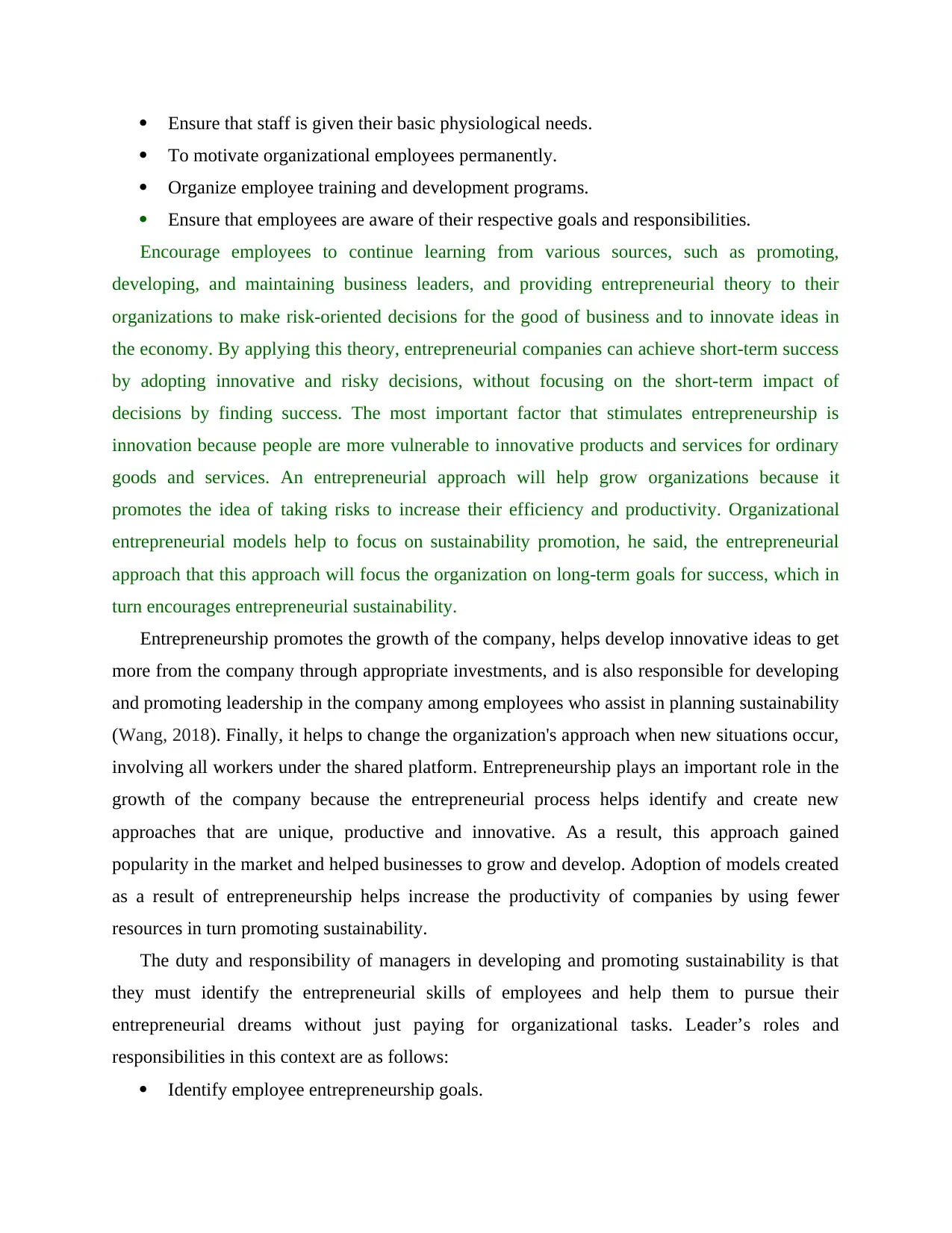
Ensure that staff is given their basic physiological needs.
To motivate organizational employees permanently.
Organize employee training and development programs.
Ensure that employees are aware of their respective goals and responsibilities.
Encourage employees to continue learning from various sources, such as promoting,
developing, and maintaining business leaders, and providing entrepreneurial theory to their
organizations to make risk-oriented decisions for the good of business and to innovate ideas in
the economy. By applying this theory, entrepreneurial companies can achieve short-term success
by adopting innovative and risky decisions, without focusing on the short-term impact of
decisions by finding success. The most important factor that stimulates entrepreneurship is
innovation because people are more vulnerable to innovative products and services for ordinary
goods and services. An entrepreneurial approach will help grow organizations because it
promotes the idea of taking risks to increase their efficiency and productivity. Organizational
entrepreneurial models help to focus on sustainability promotion, he said, the entrepreneurial
approach that this approach will focus the organization on long-term goals for success, which in
turn encourages entrepreneurial sustainability.
Entrepreneurship promotes the growth of the company, helps develop innovative ideas to get
more from the company through appropriate investments, and is also responsible for developing
and promoting leadership in the company among employees who assist in planning sustainability
(Wang, 2018). Finally, it helps to change the organization's approach when new situations occur,
involving all workers under the shared platform. Entrepreneurship plays an important role in the
growth of the company because the entrepreneurial process helps identify and create new
approaches that are unique, productive and innovative. As a result, this approach gained
popularity in the market and helped businesses to grow and develop. Adoption of models created
as a result of entrepreneurship helps increase the productivity of companies by using fewer
resources in turn promoting sustainability.
The duty and responsibility of managers in developing and promoting sustainability is that
they must identify the entrepreneurial skills of employees and help them to pursue their
entrepreneurial dreams without just paying for organizational tasks. Leader’s roles and
responsibilities in this context are as follows:
Identify employee entrepreneurship goals.
To motivate organizational employees permanently.
Organize employee training and development programs.
Ensure that employees are aware of their respective goals and responsibilities.
Encourage employees to continue learning from various sources, such as promoting,
developing, and maintaining business leaders, and providing entrepreneurial theory to their
organizations to make risk-oriented decisions for the good of business and to innovate ideas in
the economy. By applying this theory, entrepreneurial companies can achieve short-term success
by adopting innovative and risky decisions, without focusing on the short-term impact of
decisions by finding success. The most important factor that stimulates entrepreneurship is
innovation because people are more vulnerable to innovative products and services for ordinary
goods and services. An entrepreneurial approach will help grow organizations because it
promotes the idea of taking risks to increase their efficiency and productivity. Organizational
entrepreneurial models help to focus on sustainability promotion, he said, the entrepreneurial
approach that this approach will focus the organization on long-term goals for success, which in
turn encourages entrepreneurial sustainability.
Entrepreneurship promotes the growth of the company, helps develop innovative ideas to get
more from the company through appropriate investments, and is also responsible for developing
and promoting leadership in the company among employees who assist in planning sustainability
(Wang, 2018). Finally, it helps to change the organization's approach when new situations occur,
involving all workers under the shared platform. Entrepreneurship plays an important role in the
growth of the company because the entrepreneurial process helps identify and create new
approaches that are unique, productive and innovative. As a result, this approach gained
popularity in the market and helped businesses to grow and develop. Adoption of models created
as a result of entrepreneurship helps increase the productivity of companies by using fewer
resources in turn promoting sustainability.
The duty and responsibility of managers in developing and promoting sustainability is that
they must identify the entrepreneurial skills of employees and help them to pursue their
entrepreneurial dreams without just paying for organizational tasks. Leader’s roles and
responsibilities in this context are as follows:
Identify employee entrepreneurship goals.
⊘ This is a preview!⊘
Do you want full access?
Subscribe today to unlock all pages.

Trusted by 1+ million students worldwide
1 out of 14
Related Documents
Your All-in-One AI-Powered Toolkit for Academic Success.
+13062052269
info@desklib.com
Available 24*7 on WhatsApp / Email
![[object Object]](/_next/static/media/star-bottom.7253800d.svg)
Unlock your academic potential
Copyright © 2020–2025 A2Z Services. All Rights Reserved. Developed and managed by ZUCOL.





